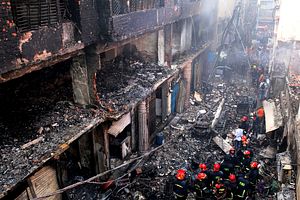In the day since a devastating fire erupted in the oldest part of Bangladesh’s capital, Awal Hossain has been searching for his younger brother.
Hossain stood outside the Dhaka Medical College Hospital on Thursday evening along with others holding pictures of family members missing after the blaze. Others brought relatives out of the morgue in coffins.
“The body of his acquaintance has been found, but I can’t find him,” Hossain said.
The fire raced through densely packed buildings in a centuries-old district of Dhaka, killing at least 67 people, officials and witnesses said Thursday.
The fire in the Chawkbazar area was mostly under control after more than 10 hours of frantic firefighting efforts. About 50 people were injured, with some critically burned.
The district dating to the Mughal era is crammed with buildings separated by narrow alleys, with residences commonly above shops, restaurants, or warehouses on the ground floors. Denizens of the Muslim-majority nation throng to Chawkbazar each year for traditional goods to celebrate iftar, when the daily fast is broken during Ramadan.
“I was talking to a customer, suddenly he shouted at me, ‘Fire! Fire!’” said Javed Hossain, a survivor who came to assess the damage to his grocery store Thursday afternoon. “I said ‘Oh, Allah,’ in a fraction of a second the fire caught my shop.”
Hossain’s brother took his hand and they leaped onto the street before the shop was engulfed in flames.
Outside the gutted store, the road was strewn with charred vehicles, pieces of still-burning metal and plastics, and hundreds of cans of body deodorant.
The blaze started late Wednesday night in one building and quickly spread to others, fire department Director General Brigadier General Ali Ahmed said.
Many of the victims were trapped inside the buildings, said Mahfuz Riben, a control room official for the Fire Service and Civil Defense in Dhaka.
“Our teams are working there but many of the recovered bodies are beyond recognition. Our people are using body bags to send them to the hospital morgue; this is a very difficult situation,” he told The Associated Press.
Fire officials initially said 81 bodies had been recovered, but later lowered the number to 67.
Russel Shikder, a fire department duty officer, said first responders had counted each body bag taken to the morgue as one victim, but that some bags contained only body parts, prompting a recount.
Shikder said there was “no more confusion” about the tally.
First responders were delayed in reaching the site in part because nearby roads were closed for national holiday commemorations on Thursday. Just after midnight as the fire burned, Bangladesh’s prime minister and president laid wreaths at a monument 1.3 kilometers away to commemorate protesters who died in a 1952 demonstration for the right to speak Bengali, the local language.
Fire officials said the road closures worsened traffic, slowing down some of the fire trucks rushing to the site.
Most buildings in Chawkbazar are used both for residential and commercial purposes despite warnings of the potential for high fatalities from fires after one killed at least 123 people in 2010. Authorities had promised to bring the buildings under regulations and remove chemical warehouses from the residential buildings.
A government eviction drive in Chawkbazar and other areas of Old Dhaka was met with protests last May right before Eid, the beginning of Ramadan, by business owners and residents.
Md. Manjur Morshed, an assistant professor of urban planning at Khulna University of Engineering and Technology in Khulna, said government regulations are routinely flouted in Chawkbazar.
“This is a historic area with a distinct culture,” he said. “They are not really abiding by the government’s rules.”
Such tragedies are shockingly common in Bangladesh, where fires, floods, ferry sinkings, and other disasters regularly claim dozens of lives or more.
In 2012, a fire raced through a garment factory on the outskirts of Dhaka, killing at least 112 people trapped behind its locked gates. Less than six months later, another building housing garment factories collapsed, killing more than 1,100 people.
The death toll from the latest fire could still rise because some of the injured people were in critical condition, said Samanta Lal Sen, head of a burn unit in the Dhaka Medical College Hospital.
Sen said at least nine of the critically injured people were being treated in his unit.
Witnesses told local TV stations that many gas cylinders stored in the buildings continued to explode one after another. They said the fire also set off explosions in fuel tanks of some vehicles that were stuck in traffic in front of the destroyed buildings.
Some reports suggested many of the fatalities were pedestrians, shoppers, or diners who died quickly as gas cylinders exploded, and the fire engulfed nearby buildings very quickly.
By Julhas Alam for The Associated Press.

































